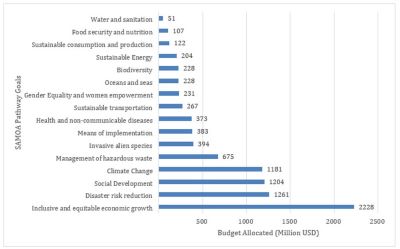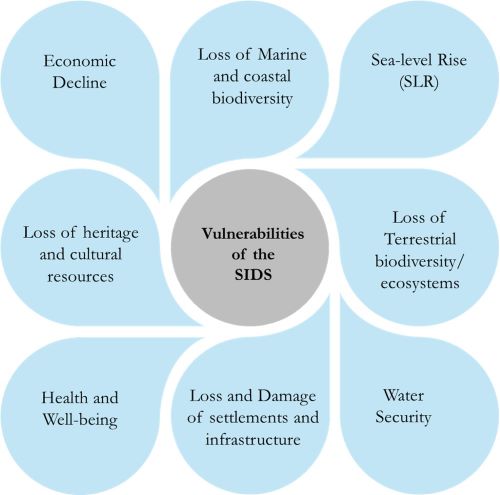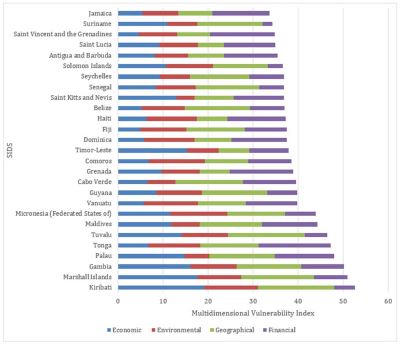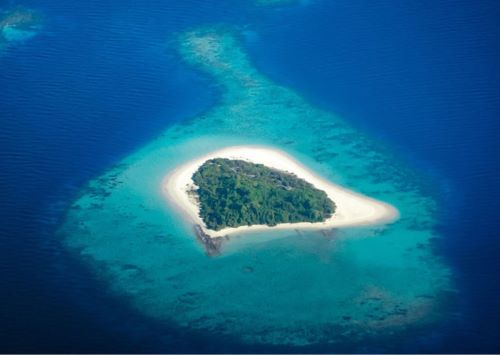Context
The year 2023 marked a pivotal moment in the fight against climate change, with temperatures soaring to record highs and extreme weather events wreaking havoc across the globe. Among the most vulnerable to these climate impacts are the Small Island Developing States (SIDS), whose unique geographical characteristics and limited resources exacerbate their susceptibility to environmental challenges. Despite their relatively low contribution to global emissions, SIDS face disproportionate risks, including rising sea levels, extreme weather events, and the acidification of rain. These threats not only endanger ecosystems critical for sustaining life but also pose significant socio-economic risks, threatening to undo decades of development progress.
Challenges Faced by SIDS
SIDS, characterized by their remoteness, small land area, and import dependency, confront a myriad of challenges in addressing climate change. Despite the existence of initiatives like the Barbados Programme of Action (BPOA), the Mauritius Strategy, and the SAMOA Pathway, implementation hurdles persist. Limited governance efficiency, financial management, awareness, and human capacity hinder the effective execution of climate responses. The allocation of resources, as depicted in the budget allocation of the SAMOA Pathway, highlights significant international investment in addressing climate change and promoting social development, disaster risk reduction, and inclusive growth in SIDS. However, translating financial support into tangible outcomes remains a formidable task.

The vast ocean territories under the jurisdiction of SIDS present both opportunities and challenges. While offering immense potential for blue economy development, these territories also attract interest from larger states seeking partnerships for resource extraction and strategic positioning. Consequently, SIDS find themselves at the crossroads of economic exploitation and environmental preservation. Their strategic significance in maintaining critical sea lanes further underscores the need for international cooperation in addressing climate risks and ensuring sustainable development.
Vulnerabilities and Health Concerns

The Multidimensional Vulnerability Index (MVI) underscores the acute vulnerabilities faced by SIDS, with a significant proportion classified as highly vulnerable. Addressing these vulnerabilities requires a holistic approach that integrates health considerations into climate resilience efforts. Initiatives such as the WHO-WMO Joint Climate and Health Programme aim to build climate-resilient health systems in SIDS, recognizing the heightened risk of climate-sensitive diseases and the inadequacy of healthcare infrastructure. Integrating meteorological information into health surveillance data can enhance preparedness and response strategies, mitigating the health impacts of climate change.

To bolster resilience against climate-induced health risks, SIDS must prioritize the integration of Primary Health Care (PHC) and Universal Health Coverage (UHC) into their healthcare systems. A multi-sectoral approach involving collaboration between health ministries and other sectors is essential to address the complex interplay between climate and health. Leveraging frameworks such as the WHO Operational Framework for Climate-Resilient Health Systems can guide efforts to strengthen health infrastructure and mitigate the impacts of climate variability on vulnerable populations.
Financing and Economic Resilience
While international financing for climate action has increased, exploring innovative mechanisms such as microfinance and insurance is imperative to enhance preparedness and resilience. Climate-proofing domestic economies against external shocks like the COVID-19 pandemic is equally critical for SIDS' long-term sustainability. Integration into global value chains and the exploration of new economic opportunities can help diversify their economies and mitigate reliance on vulnerable sectors. Initiatives like Seychelles' Blue Economy Strategic Framework and Roadmap demonstrate the potential for sustainable development through ocean economy sectors, supported by innovative finance mechanisms like blue bonds.
International Cooperation and Governance
Multilateral forums and initiatives play a vital role in enhancing SIDS' resilience to climate change. Platforms such as the Quad, G20, and Pacific Island Forum facilitate collaboration on data access, infrastructure development, and transport resilience. Strengthening governance structures and institutional frameworks is essential for effective climate action, ensuring inclusive decision-making and equitable access to resources. By fostering meaningful consultations and stakeholder engagement, international cooperation can complement domestic efforts and address the inherent limitations of SIDS in tackling climate risks.
Conclusion
In conclusion, the challenges posed by climate change demand a concerted global effort, particularly in supporting the Small Island Developing States. Despite their limited contribution to emissions, SIDS face disproportionate risks, threatening both their socio-economic stability and environmental integrity. International cooperation is indispensable in bridging the gap between climate challenges and effective responses, whether through financing mechanisms, health initiatives, or economic resilience strategies. By leveraging multilateral platforms and fostering inclusive governance structures, the global community can empower SIDS to overcome the complexities of climate change and chart a sustainable path forward.
|
Probable Questions for UPSC Mains Exam 1. Discuss the unique vulnerabilities faced by Small Island Developing States (SIDS) in the context of climate change. Analyze the role of international cooperation in addressing these vulnerabilities, with reference to relevant initiatives and challenges. (10 marks, 150 words) 2. Climate change poses significant health risks to vulnerable populations in Small Island Developing States (SIDS). Evaluate the effectiveness of integrating health considerations into climate resilience efforts in SIDS, highlighting key initiatives and strategies. Discuss the role of international cooperation in strengthening health systems and mitigating climate-induced health impacts. (15 marks, 250 words) |
Source – Indian Express, PIB







